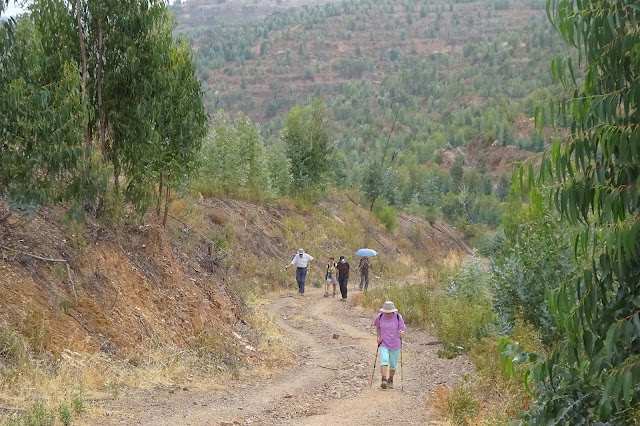As a piece of continuity from last week´s blog, here is a map of the Greek island of Lesbos (just off the coast of Turkey) which shows very clearly the lagoon where our old friend Aristotle studied the cuttlefish.
Normally the inhabitants of Lesbos would call themselves Lesbians but, because of the alleged proclivities and activities of a Greek poetess called Sappho (circa 630 - 590 BC), that word has in recent years taken on a somewhat specialised meaning. Nowadays the inhabitants, particularly the male ones, prefer to call themselves Mytileneans, Mytilene being the island´s capital city.
Moving quickly on, this early morning pre-walk picture taken by Yves illustrates the traditional English proverb “red skies at night - shepherd´s delight: red skies in the morning - shepherd´s warning.”
And, true to the saying, it did rain on us later on during the walk. And that was the exception that proves the rule; the rule being that in the Algarve it always rains in the month of August, and the exception being that this year it didn´t rain in August, the rain not coming until 1st September.
An odd expression – “the exception proves the rule”. There has been a lot of debate about what it actually means. Some people think it means that something contrary to a rule, ie. breaking the rule, is justified. Others think that if an exception exists or has to be stated, then this exception proves that there must be some rule to which the case is an exception. In other words, under this meaning of the phrase, the exception proves that the rule exists on other occasions.
For instance, if a sign at a bakery states “Doughnuts available Sunday morning”, this is the exception that proves the rule that doughnuts are not available at the bakery at any other time. The term the exception that proves the rule is derived from a Latin legal phrase first used by Cicero, exceptio probat regulam in casibus non exceptis, which means the exception confirms/ proves/tests the rule in cases not excepted. It all depends on how you want to translate the word probat. Cicero lived a little bit later than Sappho and Aristotle, from 106 BC until 43 B C when he was assassinated because the powers that be in Rome found him inconvenient.
As for our walk this week, we welcomed Hazel back after several weeks off. So we deliberately made it not too strenuous.
 |
| The Starters: Maria in the driving seat because she is "family# |
Proceeding along a familiar track- part of the Algarve Way in fact – we found that the road had been blocked by a tree; fallen or deliberately felled, we could not determine.

Anyway, not too much of an obstacle.
We made a modest ascent into Rod´s Three Hills area but did not attack any of them. Then, trying to keep the walk reasonably short for Hazel´s sake, we ventured down a path that was new to us. This turned out to be a bit steep.
Then steeper and very steep, in fact, but nobody came to any harm.
Then it was umbrella time as the rain arrived, albeit a day late. We took the same gentle route home as we had taken coming out. And when we came to the fallen tree – remember that one?
The Track and the Statistics
At 8,85 kms and nearly 3 hours, it was a bit more than I had intended, but our average speed was better than on some recent outings.
Then Donna Fernanda produced an excellent meal
 |
| Not another beer ! |
Conversation centred mainly on the matter of passports and visa requirements in various countries. Suffice to say, everyone had their own ideas.
Now last week´ s quiz:-
The question was "What is the connection between these four words?"
Paul arrived at the answer:




























2 comments:
This week’s connection.
Hard to give a hint without adding 3 geographically………how about zil and silia?
Very nice blog with some food for thought..
My answer to the last Blog quiz was "gorjeta". The first word in Google translate to English is "tip"!! So.....
As to this week's
Mal
Bel
Tai
Alg
Post a Comment